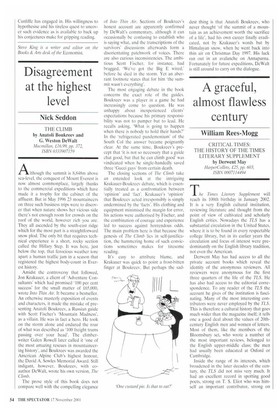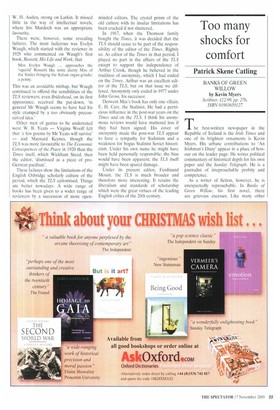A graceful, almost flawless century
William Rees-Mogg
CRITICAL TIMES: THE HISTORY OF THE TIMES LITERARY SUPPLEMENT by Derwent May HawerCollins, 125, pp. 603, ISBN 0007114494 The Times Literary Supplement will reach its 100th birthday in January 2002. It is a very English cultural institution, reviewing literature and thought from the point of view of cultivated and scholarly English critics. Nowadays the TLS has a substantial circulation in the United States, where it is to be found in every respectable college library, but in its earlier years the circulation and focus of interest were predominantly on the English library tradition, not even the American.
Derwent May has had access to all the private account books which reveal the identity of the anonymous reviewers. All reviewers were anonymous for the first three quarters of the life of the TLS. He has also had access to the editorial correspondence. To any reader of the TLS the account he gives of the institution is fascinating. Many of the most interesting contributors were never employed by the TLS. This is therefore a cultural history that goes much wider than the magazine itself; it tells one a good deal about the values of 20thcentury English men and women of letters. Most of them, like the members of the Bloomsbury set, who wrote a number of the most important reviews, belonged to the English upper-middle class; the men had usually been educated at Oxford or Cambridge.
Inside the range of its interests, which broadened in the later decades of the century. the TLS did not miss very much. It had an excellent record in spotting good poets, strong on T. S. Eliot who was himself an important contributor, strong on W. H, Auden. strong on Larkin. It missed little in the way of intellectual novels, where Iris Murdoch was an appropriate favourite.
There were, however, some revealing failures, The most ludicrous was Evelyn Waugh, which started with the reviewer in 1928 who commented on Waugh's first book, Rossetti, His Life and Work, that
Miss Evelyn Waugh ... approaches the 'squalid' Rossetti like some dainty Miss of the Sixties bringing the Italian organ-grinder a penny.
This was an avoidable mishap, but Waugh continued to offend the sensibilities of the TLS reviewers; even Thideshead, on its first appearance, received the put-down, in general Mr Waugh seems to have had his style cramped by a too obviously preconceived idea.'
Other men of genius to be underrated were W. B, Yeats — Virgina Woolf felt that 'a few poems by Mr Yeats will survive' — and Maynard Keynes, though the TLS was more favourable to The Economic Consequences of the Peace in 1920 than the Times itself, which Wickham Steed, then the editor, 'dismissed as a piece of proGerman pacifism'.
These failures show the limitations of the English Oxbridge scholarly culture of the period, which the TLS epitomised. Things are better nowadays. A wide range of books has been given to a wider range of reviewers by a succession of more open
minded editors. The crystal prism of the old culture with its insular limitations has been cracked if not shattered.
In 1967, when the Thomson family bought the Times, it was decided that the TLS should cease to be part of the responsibility of the editor of the Times. Rightly so. As editor of the Times in that period, I played no part in the affairs of the TLS except to support the independence of Arthur Crook, though he believed in the tradition of anonymity, which I had ended on the Times. Arthur was an excellent editor of the TLS, but on that issue we differed. Anonymity only ended in 1977 under John Gross, his successor.
Derwem May's book has only one villain, E. H. Carr. the Stalinist, He had a pernicious influence in the post-war years on the Times and on the TLS. I think his anonymous reviews would have mattered less if they had been signed. His cover of anonymity made the post-war TLS appear to have a sympathy for Stalinism and a weakness for bogus Stalinist Soviet historicism. Under his own name he might have been held personally responsible; the bias would have been apparent; the TLS itself might have been spared damage.
Under its present editor, Ferdinand Mount. the TLS is much broader and therefore more interesting. It retains the liberalism and standards of scholarship which were the great virtues of the leading English critics of the 20th century.























































































 Previous page
Previous page